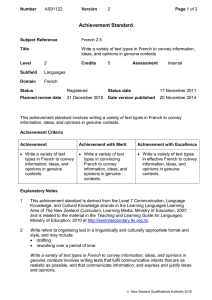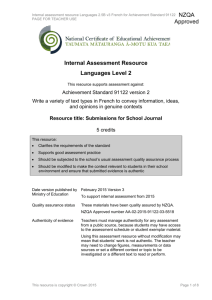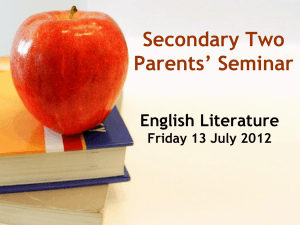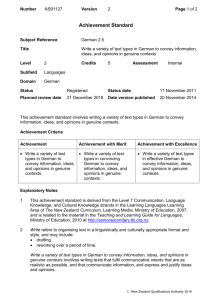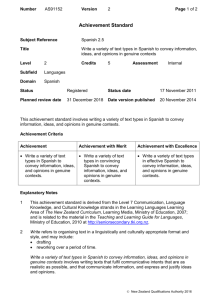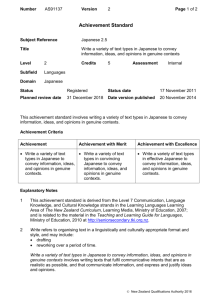Level 2 Template 2.5 Writing
advertisement
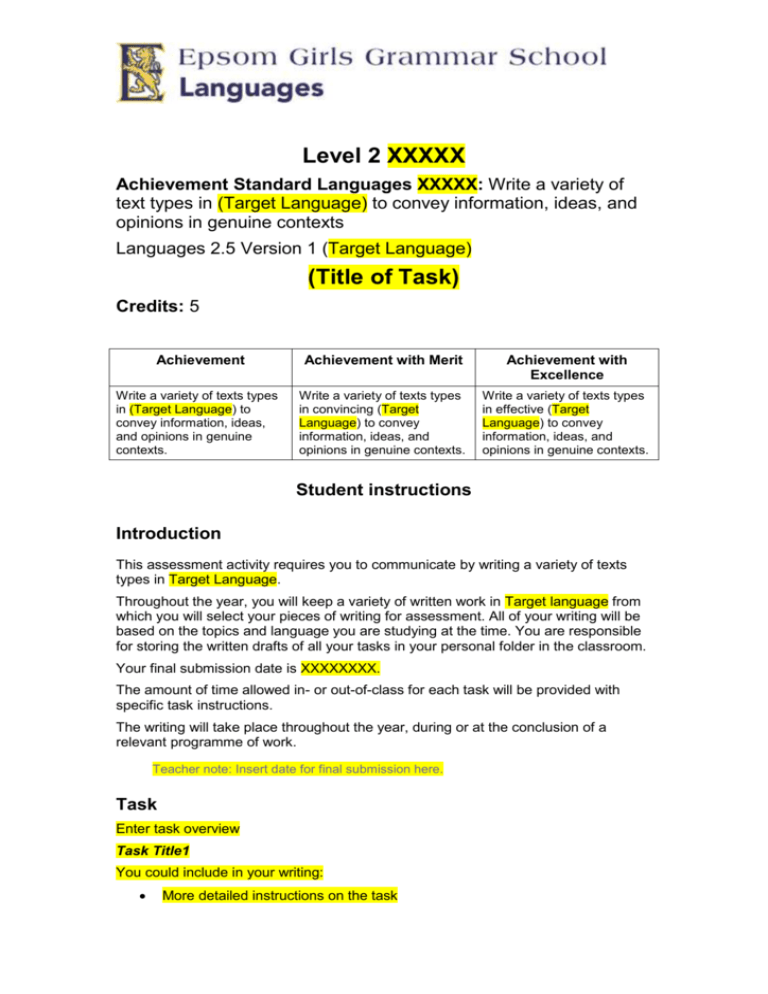
Level 2 XXXXX Achievement Standard Languages XXXXX: Write a variety of text types in (Target Language) to convey information, ideas, and opinions in genuine contexts Languages 2.5 Version 1 (Target Language) (Title of Task) Credits: 5 Achievement Achievement with Merit Achievement with Excellence Write a variety of texts types in (Target Language) to convey information, ideas, and opinions in genuine contexts. Write a variety of texts types in convincing (Target Language) to convey information, ideas, and opinions in genuine contexts. Write a variety of texts types in effective (Target Language) to convey information, ideas, and opinions in genuine contexts. Student instructions Introduction This assessment activity requires you to communicate by writing a variety of texts types in Target Language. Throughout the year, you will keep a variety of written work in Target language from which you will select your pieces of writing for assessment. All of your writing will be based on the topics and language you are studying at the time. You are responsible for storing the written drafts of all your tasks in your personal folder in the classroom. Your final submission date is XXXXXXXX. The amount of time allowed in- or out-of-class for each task will be provided with specific task instructions. The writing will take place throughout the year, during or at the conclusion of a relevant programme of work. Teacher note: Insert date for final submission here. Task Enter task overview Task Title1 You could include in your writing: More detailed instructions on the task Task Title 2 You could include in your writing: More detailed instructions on the task Task Title 3 You could include in your writing: More detailed instructions on the task Assessment Conditions The length of the texts may vary. The total length (across the texts) should be approximately 400 words/800 kana/400 characters, however, quality is more important than quantity. Refer to the Make sure that your texts collectively demonstrate the quality of writing of which you are capable. Your teacher will also give you general feedback about your writing, or feedback to the whole class. You may then rework your writing before you file it. You must keep all your drafts in your classroom folder. Only your final versions will be assessed. Your writing can be in electronic format but you must ensure that you store backup copies and label versions clearly to avoid loss and confusion. As well as electronic format, you must also keep a hard copy in your classroom folder. Use your language and cultural knowledge to create texts that are appropriate for the scenario and the reader. In your texts, you will communicate information and express and justify ideas and opinions. Unmodified extracts from any external source may not be included without acknowledgement of sources and will not be considered for the final achievement judgement. You may not use the language samples from the assessment schedule in your own work without substantial modification. All work must be your own. You may not use the language samples from the assessment schedule in your own work without substantial modification. If there is any doubt, the school’s authenticity policy will be enacted. See the languages authenticity statement below. You may be asked to verify the authenticity of your work by doing further writing in class time. Draft and rework your writing over time. You may use resources such as search engines, word lists, spelling and grammar checkers, pamphlets, dictionaries, textbooks, and grammar notes to help you. But you may not ask someone else to proofread or correct your writing. Select and submit the final version of at least three texts for assessment. Texts may be submitted in electronic form or handwritten. NZQA says: Unmodified extracts from any external source should not be included without acknowledgement of sources and will not be considered for the final achievement judgement. When considering the authenticity of the evidence: ‘the teacher’s knowledge of the student’s work and learning enables the teacher to make judgments of the authenticity of the evidence’ (NZC pp 39 -41). At Epsom Girls Grammar School, this means: It is vital that you present only your own work. You may use words and phrases from your resources but must be certain to adapt them. You may not reproduce whole sentences or paragraphs from the resources, or from previously corrected work. If the teacher suspects that you have used work that is not your own, you may be asked questions to test your level of understanding. Where evidence indicates work presented is not your own work, ‘Not Achieved’ will be awarded. Definitions 1 Write refers to organising text in a linguistically and culturally appropriate format and style, and may include: drafting reworking over a period of time. Write a variety of text types in (Target Language) to convey information, ideas, and opinions in genuine contexts involves writing texts that fulfil communicative intents that are as realistic as possible, and that communicate information, and express and justify ideas and opinions. Communication is achieved overall, despite inconsistencies, such as: format spelling lexical choice level of formality language conventions language features. Write a variety of text types in convincing (Target Language) to convey information, ideas, and opinions in genuine contexts involves developing and connecting information, ideas, and opinions in (Target Language) that is generally credible. A range of language and language features are selected and used that are fit for purpose and audience. Communication is not significantly hindered by inconsistencies. Write a variety of text types in effective (Target Language) to convey information, ideas, and opinions in genuine contexts involves developing and integrating information, ideas, and opinions in (Target Language) that is controlled. A range of language and language features that are fit for purpose and audience are capably selected and successfully used. Communication is not hindered by inconsistencies. 2 Variety refers to a selection made from a range of different texts created for different audiences and purposes. At all times the quality of the texts in the selection, considered as a whole, is more important than length. 3 Genuine contexts refers to real-life rather than contrived or artificial situations. Where situations involve simulation, the simulation should be as realistic as possible: ie plausible, rather than contrived. 4 A range of commonly used real-life resources may be used to support drafting and reworking. 5 Conditions of Assessment related to this achievement standard can be found at www.tki.org.nz/e/community/ncea/conditions-assessment.php. Characteristics of Quality Writing Quality writing: effectively communicates information and expresses and justifies ideas and opinions that are relevant in the context uses language and cultural knowledge appropriate for the task and the intended audience uses language appropriate to the text type uses appropriate formats and styles develops and connects the opinions, information, and ideas to produce an integrated whole gives examples and makes comparisons to illustrate points gives convincing reasons and explanations clearly sequences information and ideas uses connecting words. uses language expected at Level 7 of the NZ Curriculum (your teacher will provide examples of language at this level) Quality writing may also show knowledge of cultural aspects of France in order to make comparisons where appropriate. Communication will not be hindered by inconsistencies in, for example, format, spelling, lexical choice, level of formality, language conventions, language features. Assessment schedule: Languages XXXXX (Target Language) – Title Evidence/Judgements for Achievement Evidence/Judgements for Achievement with Merit Evidence/Judgements for Achievement with Excellence (Target Language) is used to communicate and justify opinion(s) and/or information, and/or ideas in at least three different text types with genuine purposes. The texts fulfil the communicative intents of the tasks and are characterised by the selection of language and language features fit for the task and audience. Cultural conventions are used where appropriate. Communication is achieved overall, although there may be inconsistencies in choice and use of language features. The overall selection of text types is approximately 400 words/800 kana/400 characters. Convincing (Target Language) is used to develop and justify opinion(s) and/or information, and/or ideas in at least three different text types with genuine purposes. Opinions, information, and ideas are generally expressed in a credible and connected way. A range of language and language features are used that fit the specific purpose and audience for each text type, using cultural conventions where appropriate. Communication is not significantly hindered by inconsistencies in choice and use of language and language features. The overall selection of text types is approximately 400 words/800 kana/400 characters. Effective (Target Language) is used to develop and justify opinion(s) and/or information, and/or ideas in at least three different text types with genuine purposes. Opinions, information, and ideas are expressed in a controlled and integrated way. A range of language and language features are capably selected and successfully used to fit the specific purpose and audience for each text type, using cultural conventions where appropriate. Communication is not hindered by inconsistencies in choice and use of language and language features. The overall selection of text types is approximately 400 words/800 kana/400 characters. Example Language Sample Example Language Sample Example Language Sample You may not use the language in the sample in your work unless it has been significantly reworked. Final grades will be decided using professional judgement based on a holistic examination of the evidence provided against the criteria in the Achievement Standard.
